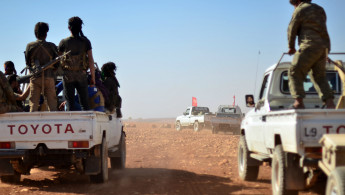Islamic State counters Turkey-backed rebels' march on Raqqa stronghold
Islamic State fighters are engaged in a counter-offensive against Turkey-backed FSA rebels in northern Syria.
On Wednesday, the Syrian Observatory for Human Rights reported that IS advances in Aleppo province had seen the extremist group wrestle back control of 17 villages including Salwa, Ghor, Thalthana, Masodia, Baraan, and Baroza, making further inroads into the town of Akhtarin, three weeks after initially retreating from the city, where it reported that clashes were ongoing.
Slowing progress towards al-Bab
However, other observers debated the extent of IS’ counter-offensive with some claiming on social media that FSA forces had re-asserted control in Akhtarin, located 48 km north-east of Aleppo.
Commentators say that the IS-counter offensive is aimed at slowing the progress of Turkey-backed rebels towards the town of al-Bab, located 28 km south-east of Akhtarin, and one of IS’ last remaining strongholds in Aleppo province.
Since launching operation “Euphrates Shield” inside Syria in late August, Turkey says that rebels it backs have taken control of territory totalling some 1350 sq km.
Turkish role in Raqqa
Turkey’s President Recep Tayyip Erdogan has repeatedly stressed Ankara’s desire to be involved in any decisive push towards retaking Raqqa, IS’ main stronghold in Syria and has said that the Euphrates Shield operation is “marching towards al-Bab, then to Manbij and Raqqa.”
The US has previously expressed some reservations about Turkey playing a role in the fight to liberate Raqqa, in part due to concerns that Turkey-backed rebels will clash with US-backed Kurdish forces.
Turkey views Kurdish forces in Syria as synonymous with the Turkey-based PKK, which Ankara designates a “terrorist” organisation, and has targeted Kurdish units on several occasions since the Euphrates Shield Operation began.
However, on Monday, Pentagon Spokesman Peter Cook said that Washington communicated with “the Turkish leadership about the best approach to addressing the fight for Raqqa,” suggesting negotiations over the extent of Turkey’s role remained ongoing.
Meanwhile, on Tuesday General Hulusi Akar, head of Turkey’s armed forces met in Moscow with his Russian counterpart Valery Gerasimov to discuss Syria’s ongoing crisis, ways to fight terrorism, and promote greater military cooperation between the two states.
Although backing opposing forces in Syria’s civil war, the emergence of IS has provided Moscow and Ankara with a common enemy.
In August, an Erdogan visit to Moscow heralded the start of a purported “tripartite cooperation mechanism” comprising the two states’ armies, intelligence units, and foreign ministries. Russian media has previously claimed that Moscow has provided Ankara with intelligence that has helped inform Euphrates Shield operations.





 Follow the Middle East's top stories in English at The New Arab on Google News
Follow the Middle East's top stories in English at The New Arab on Google News
![Netanyahu furiously denounced the ICC [Getty]](/sites/default/files/styles/image_330x185/public/2024-11/GettyImages-2169352575.jpg?h=199d8c1f&itok=-vRiruf5)
![Both Hamas and the Palestinian Authority welcomed the ICC arrest warrants [Getty]](/sites/default/files/styles/image_330x185/public/2024-11/GettyImages-2178351173.jpg?h=199d8c1f&itok=TV858iVg)
